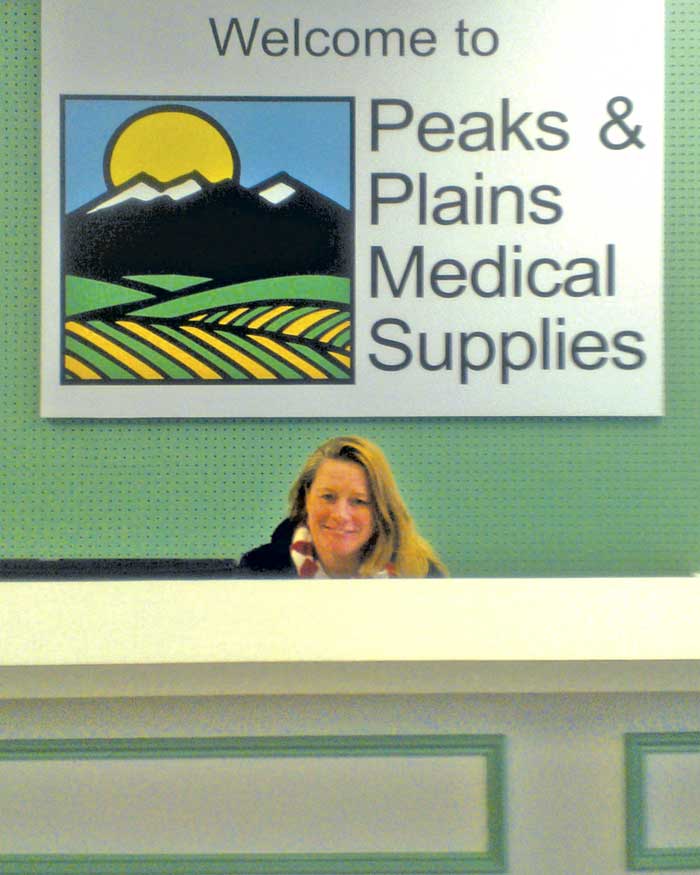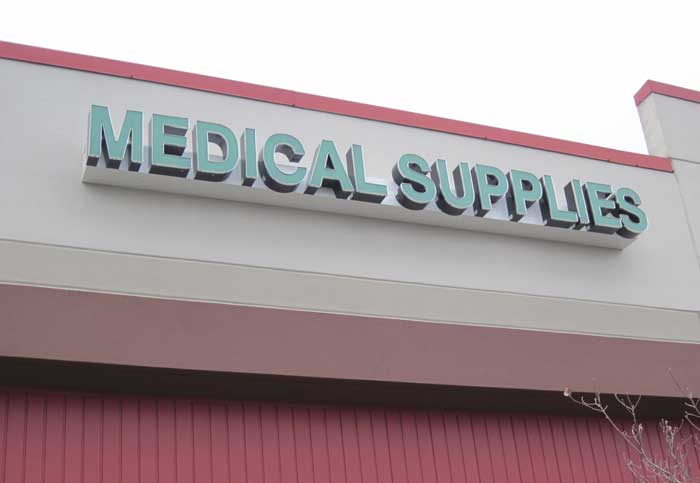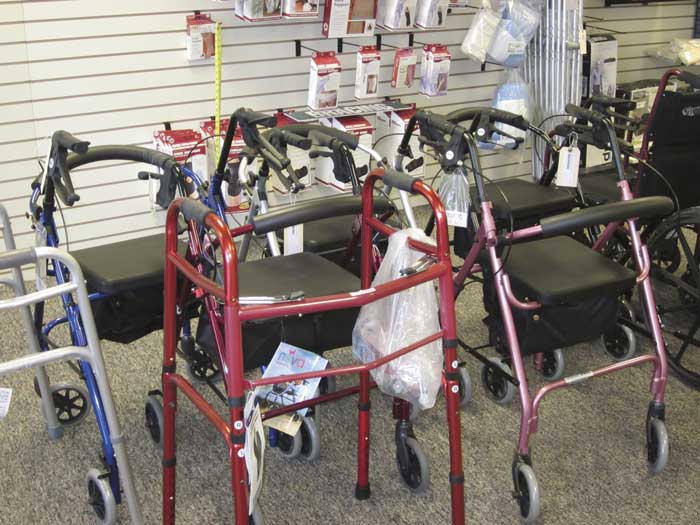Goats that are having their kids… cement contractors… tattoo artists. Home medical equipment isn’t just for people living with medical conditions anymore. In the new world of HME, the one in which savvy providers are trying to dramatically reduce their dependence on Medicare and other third-party payers, it pays to look for other outlets for those products. It’s probably safe to say that one of the masters of this is Leigh McNellis (pictured above), president of Peaks & Plains Medical, Inc. in Spokane Valley, Wash. McNellis has found some of the most unusual ways of building her cash sales—and she’s looking for more. “We check under every rock for every opportunity,” she says, noting that the company will add a second retail store in March.
 McNellis’ company is a traditional HME business that carries everything except respiratory and high-end rehab products. Her late husband, Bob, started the company in 1999, specializing in orthotic splints and diabetic shoes. Early on he laid the groundwork for spotting and developing business opportunities.
McNellis’ company is a traditional HME business that carries everything except respiratory and high-end rehab products. Her late husband, Bob, started the company in 1999, specializing in orthotic splints and diabetic shoes. Early on he laid the groundwork for spotting and developing business opportunities.
“As he traveled the roads in Montana, Idaho and Washington to fit his patients, customers would talk to him. They would ask about supplies,” McNellis says. “He thought there were some business opportunities out there and he decided to go after those opportunities. That’s how we grew the business.”
Bob McNellis added incontinence products and gloves, two lines that have proven to be mainstays at Peaks & Plains. He also built a business providing long-term care and assisted living facilities and their clients with a variety of supplies such as briefs, shampoos, body washes, toothbrushes and the like.
“We have been a growing organization ever since by trying to understand the changing climate and adjust our business focus where necessary,” McNellis says. “If clients are asking for something, we’re trying to figure out how to get it.”
Goats, Cement and Tattoos
So how do goats, cement and tattoos factor into the Peaks & Plains business? Once again, it was a case of responding to clients’ requests. “Our customers are the ones that are creative,” McNellis says. “We just try to fill their needs. For example, we have a cement contractor who purchases cases of baby nasal aspirators each month. He uses them to test cement.”
The contractor had worked in a different part of the country, where using baby nasal aspirators was a common way to test the consistency of cement. When he moved to Spokane he sought out an HME store where he could regularly obtain the aspirators. Peaks & Plains was happy to supply the numbers he needed on a recurring basis, McNellis says. “He came in, told us what he wanted and he keeps coming back with his order every month.”
Goat farmers in the rural area around Spokane have discovered that disposable bed pads are easier and cheaper than hay for lining stalls when their goats are dropping their kids. So during birthing season Peaks & Plains supplies them with plenty of bed pads.
 The tattoo business started last year, when one of the company’s salesmen who has a few tattoos recognized that tattoo artists use a lot of gloves. He learned the type of gloves the artists needed and Peaks & Plains started carrying them. “Then they wanted some type of wound care, then skin ointments,” McNellis says. “Amazingly, they use a lot of products our core customers use—gloves, disinfectants, splatter-proof protectors, skin ointments.”
The tattoo business started last year, when one of the company’s salesmen who has a few tattoos recognized that tattoo artists use a lot of gloves. He learned the type of gloves the artists needed and Peaks & Plains started carrying them. “Then they wanted some type of wound care, then skin ointments,” McNellis says. “Amazingly, they use a lot of products our core customers use—gloves, disinfectants, splatter-proof protectors, skin ointments.”
Peaks & Plains began carrying those products, and word got out. The burgeoning business drew the company to a regional tattoo convention last September. “We learned a ton of things,” McNellis says. “Artists would share what works and what doesn’t work and we responded, bringing in branded products that tattoo artists prefer.” McNellis intends to continue growing that sector. “Everything they buy, they buy with cash and I’m glad about that,” she says.
The tattoo gloves opened the door to other markets, too. Tattoo gloves are the same as those used in veterinary clinics, auto centers and hair salons, so Peaks & Plains is courting those businesses by sending out mailers advertising the gloves and other products they might need.
The Cash Cow
McNellis is keen on growing the company’s cash and private-pay insurance business, which currently accounts for about 45 to 47 percent of revenue. She believes it is the only way to survive.
Reimbursement is low and getting lower, she points out, and Medicare and other payers are often slow to pay. “Once you start drinking from that cash cow, you don’t want to give it up,” she says with a laugh.
While Spokane is not in Round 2 of competitive bidding and thus not affected by those reimbursement rates, “we are paying attention to them,” McNellis says, adding that she believes the Centers for Medicare & Medicaid Services will eventually announce that it is suspending competitive bidding and simply averaging out the bidding prices for all providers.
Because of that, Peaks & Plains’ new store—which will be located in the very far northern part of the city about 15 miles from the company’s warehouse—will have a Medicare corner showing clients what their Medicare dollars will buy. McNellis says she will have the better-grade products on hand to show them the difference.
 In addition, within the next quarter she plans to drop Medicare items such as canes, which are not cost effective. “I hate to do that, but you’ve got to find a better way to do things.”
In addition, within the next quarter she plans to drop Medicare items such as canes, which are not cost effective. “I hate to do that, but you’ve got to find a better way to do things.”
McNellis is banking on the new 1,600 square-foot retail store to further anchor Peaks & Plains’ footing in the area. “We will be the only medical supply store in north Spokane,” she says. “I’ve been out calling on pharmacies, letting then know we are going to be there and they are excited because they want to start making referrals. Right now they are having to refer into downtown Spokane and not everyone wants to drive that far.”
She also wants to grow another sector of Peaks & Plains, its distributor business, which was instituted a year ago as another way of bringing in business that is not dependent on government pay. “Because we have a large warehouse, we’re able to bring in semi loads of supplies, gloves and incontinence products. Many smaller medical supply companies and some pharmacies purchase these products from us. We have a low markup, good terms and it helps turn our inventory faster that way. I’d like to concentrate on growing this piece.”
McNellis doesn’t know exactly how the future will play out, but the adaptability built into the company’s DNA will definitely be an asset. “I think our future will look different, but I’m just not really sure what that is right now.” She is sure of one thing, however—Peaks & Plains will continue to reinvent itself as it strives to serve the needs of its customers, whatever that need may be. Learn more at www.peaks-plains.com.
Sidebar
Revving up Retail
When it comes to retail, Peaks & Plains moves a lot of product and continues to draw new customers. “We do a lot of lift chairs in our retail store,” says Leigh McNellis, president. “We subscribe to retail HME consultant Jack Evans’ philosophy: If you have one on the floor, you’ll sell one. If you have 10 to 12, you’ll sell 10 to 12. So we always have 10 to 12—various types, colors, some with heat. That’s why we sell so many.”
Reasonable prices also help. McNellis might not make the markup that her competitors do on each item, but she sells a lot of those items. “We do quite bit of compression hosiery and orthotic splints. Again, we are reasonably priced compared to some of the pharmacies and such. We’re able to have great incontinence prices in our retail store as well—good or better pricing than Walgreen’s or Costco.”
Another selling point: For a cheaper price than her competitors, clients can get medical-grade incontinence products as opposed to commercial products. McNellis is constantly on the lookout for different products and markets.
“We try to stay on top of that as best we can and try to be the first in Spokane to offer a product,” she says. For example, Peaks & Plains is the first company in the area to offer the Helper Lift, an inflatable patient lift that inflates in three minutes to help someone who has fallen, she says.
“We’re looking at other fast-turning items for our retail stores,” McNellis notes. “The Presto-e machine that allows people to e-mail without a computer, the inflatable patient lift, the Audio Fox speakers are all other cash products that we’re carrying trying to influence cash sales.”
Much of Peaks & Plains’ business comes via word of mouth, but McNellis bolsters that with frequent and varied advertising. The company does radio ads featuring different products each month and she keeps on top of the stations’ demographics “so we know we are not wasting our time with some stations.”
The company also advertises on television. “We were surprised it was as reasonable as it was,” McNellis says, adding that she targets her audience by advertising on shows likely to draw the attention of her core clientele. “It would be foolish to advertise during ‘American Idol.’ It makes more sense to advertise with ‘Andy Griffith’ reruns and ‘Petticoat Junction.’ That’s the cheapest advertising, so we get more bang for our buck there.”
